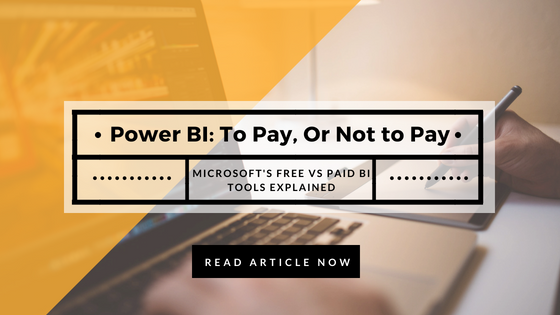In the modern digital economy, it’s often said that ‘data is the new oil’.
That’s because the insights you can derive from raw data can inform the decisions you make, and contribute significantly to its success.
However, as a small- to medium-sized enterprise (SME), is it worth your time and effort to extract and refine data generated by your business for your consumption?
Employing business intelligence (BI) and data analytics is how you do so, and just like drilling for oil, it requires specialised skills and tools to do so effectively.
Here are two of your options for acquiring the necessary data analytics capabilities for your SME:
- Hiring an in-house data analyst, or
- Outsourcing data analytics to a third-party managed service provider (MSP).
Let’s take a look at the pros and cons of either option.
Hiring an In-house Data Analyst - Pros and Cons
Pros:
1) More Control Over Dashboards And Reports
With a full-time data analyst, you won't be starting with templated reports, and can build everything from the ground-up. This is especially important if you foresee needing customised reports on most of your business processes.
2) You Save Time and Labour in Managing Data
Managing a significant amount of data requires regular manual input and control. This may require a full-time data analyst, and having one in-house to do it for you would be more cost-effective.
A side benefit is that your in-house data analyst would be closer to the sources of data, therefore reducing the friction in uploading up-to-date data.
Should You Insource Or Outsource Your Business's IT Needs? Here Are Some Factors To Consider.
Cons:
1. A Full-time In-house Data Analyst Can Be Costly
Because data analytics is so popular among businesses, demand for data talents exceed supply.
In Singapore, it's quite costly to hire a full-time in-house data analyst. For example, take a look at this chart from Glassdoor:
%20(1).png?width=1000&name=Glassdoor_data%20analyst%20salary%20(1)%20(1).png)
Overview of a data analyst's average salary in Singapore; Source: Glassdoor
The monthly wage of a business analyst in Singapore starts at SGD $4,600, as of June 2022 (numbers may have changed since then).
And this is just for a fresh graduate, who lacks the domain expertise needed to process more complex data. Hence, it’ll take a longer time to show returns from investing in an in-house data analyst.
2. Talent Retention of Data Analysts is Challenging
One of the greatest challenges in having an in-house data analyst is to ensure your analyst is productive and focusing on delivering the right results.
Unfortunately, not all managers have the domain knowledge to mentor and advance a data analyst's skills.
Along with the high market demand for such talents, the turnover rate among data analysts averages just 1 - 2 years.
Businesses that do not have a career progression plan for the analyst may see the employee leaving within 2 years.
Outsourcing BI To An MSP - Pros and Cons
Pros:
1. Avoid Reinventing The Wheel and Leverage on Industry-proven Metrics
Alternatively, you could outsource your BI needs to an MSP.
While this means ceding control over your data and passing up the opportunity to cultivate in-house expertise, you generate insights more quickly and with less resources expended in return.
Most metrics that your SME might value in a report are standard throughout other organisations, and MSPs will provide reports with those metrics.
For example, Sales and Marketing looks at CAC (Customer Acquisition Cost) and LTV (Lifetime Value of Customer). These are standard metrics which can be applied quickly to your business processes.
2. Boost Effectiveness with Quick Report Delivery
%20(1)%20(1).jpg?width=1000&name=myriam-jessier-eveI7MOcSmw-unsplash%20(2)%20(1)%20(1).jpg)
MSPs maintain a team of IT personnel that are experienced in setting up automated reports.
This means when you outsource your BI needs to them, this gives you insights into the health of your SME that much sooner, and enables you to make data-driven business decisions in a timely manner.
3. Significantly More Cost-effective than Hiring In-hosue
While the cost-per-day of the services provided by an MSP can be higher than the monthly salary of an in-house data analyst, you’d only need those services for a short period of time.
With minor customisations to better fit your business needs, you can expect setup fees to be less than S$10,000. After that, you’d only need minor changes in your reports, and your MSP can provide maintenance and ensure the template remains up-to-date.
Cons:
1. Loss Of Control Over Your Report Templates
If you want your reports in an exact format, it may be difficult to get your MSP to do minor changes without incurring customisation fees.
With an in-house analyst, you can change the format of your reports as many times as you’d like.
2. Cookie-cutter Reports That Don’t Account For Unique Business Processes
With an MSP, you have to expect reports with templates that won’t match your business practices exactly, unless you pay for customisation.
However, you can still leverage even these cookie-cutter reports to gain quick insights that helps you steer your SME in the right direction.
3. Lack Of Understanding Of Your Current Software Systems
Your MSP may not be fully familiar with the intricacies of working with your specific datasets.
For example, the setup of your ERP software might be complex, and the standard reports may not give you the exact numbers you need. With an in-house data analyst, you could more easily tailor your report templates to better fit your ERP software.
Customising your reports to fit your current systems may get expensive, unless your MSP fully understands what your SME is currently using.
Consider Outsourcing Your BI Needs To An MSP Like AFON
-1.jpg?width=1000&name=pexels-andrea-piacquadio-3756678%20(1)-1.jpg)
While you may be sitting on a treasure trove of data generated by your SME’s business processes, you may not possess the skills and expertise needed to gain utility out of this valuable resource.
Just like oil, you require specialised tools and employees with domain expertise to refine data into actionable insights that fuel your data-driven business decisions.
You can opt to hire an in-house data analyst for this purpose, and there are good reasons to do so. But for an SME with a limited budget like yours, it might not be the best decision.
Alternatively, you can outsource your BI needs to a third-party MSP like AFON, which can prove to be the more financially sound choice for your SME.
Our Managed BI Services Are Powered By Power BI
At AFON, we leverage the capabilities of Microsoft Power BI to provide your SME with managed business intelligence (BI) services at an affordable rate.
With one of the most powerful and recognised BI tools on the market today, we'll provide you with valuable, actionable insights that best drive your business decision-making process.
Learn about Power BI in 1 minute; Source: Microsoft Power BI
We also invest heavily in keeping up-to-date on industry best practices, which makes us a good choice as a partner to outsource your BI needs to.
We can provide your SME with dashboards and interactive reports, which are designed to help guide your decision-making processes in several key areas such as:
- Revenues vs. Budget
- Operations
- Sales and marketing KPIs
Our reports and dashboards are mobile-friendly so that you can access them anywhere, at any time. We also offer scheduled emails with report updates to help you stay up-to-date with your SME’s current status.
All of this means that our managed BI services are a solid option for your SME, especially if you don't have any in-house data analysts with the skillset to handle your SME's BI needs.
However, if you do have data analysts in your employ and wish to provide them with the necessary tools, you can do so by acquiring user licenses for Power BI for them; either free, or paid.
Then the question is, should you settle for Power BI Free, or shell out for Power BI Pro?
Click on the image below to find out what each type of user license offers, and what are the factors you should consider going into this decision.





